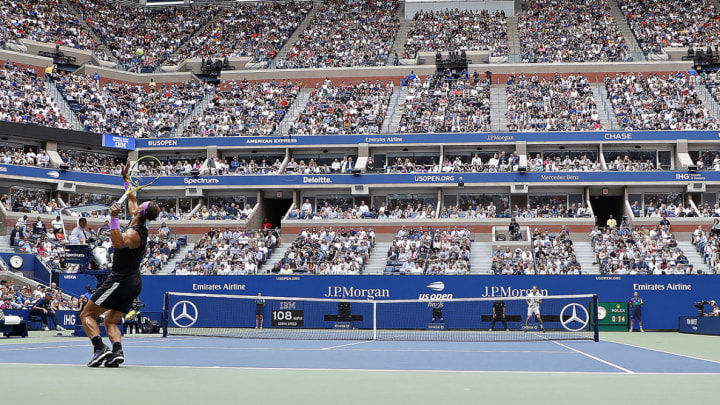What Will Tennis Look Like When it Finally Returns?

On the latest Beyond the Baseline podcast, host Jon Wertheim talks with longtime commentator Ted Robinson about what tennis will like look when it is finally able to return; the logistics of a return; the impact (and possible benefit) of a long layoff on players, including the financial consequences for some; and much more.
(Listen to the latest Beyond the Baseline podcast here. The following transcript has been edited and condensed for clarity.)
Ted Robinson: Every sport is going through this. How do we come back? I think it's imperative for tennis to come back with competition, as soon as they can. Safely—safely is the obvious caveat here, but safely, meaning there may not be fans or very limited fans, but competition. I'm coming to this from the standpoint of players ranked say No. 75 and below, No. 100 and below. I know you've already touched on this. T.C. Live about this. But those players—and by the way, their assorted teams, physios, trainers, administrators, the chair umpires, the administrators of the tours, broadcast entities around the world and all the sort of jobs. That's a lot of jobs. And I just think it's imperative for tennis when it's safe to have competition, even if it means competition with limited access.
Jon Wertheim: I agree with you. But the one thing I've heard is the counter to that is, look, you're talking about athletes from all over the world, from different countries with different health standards. You're talking about, as you say, teams and physios and journalists and tournament staff. And even if you have a closed-door scenario and even if you don't have doubles or juniors, you're still talking about hundreds and hundreds and hundreds of people walking around the grounds. Given what we know about these spread rates and given what we know about how many fatalities result from these rates, if there are a thousand people at a major—which is a pretty low estimate given their 256 players in the main draw—you're still probably likely to have a few fatalities.
Do we risk that? What do we do for a global sport where Western Europe might be on the mend but other parts of the world might be behind? Do we say we're going to have the U.S. Open, but if you're from India, Iran....I'm just making up countries. But if you're from any of five countries, you can't play. Is that fair to still hold an event?
TR: You're a 100% right, Jon. And I think this is what's going to happen. I think everybody's going to have to have a pass like I had when I went to see Dead & Company on New Year's Eve in San Francisco. I think whenever we come back, everybody's going to have to be tested. Right? And you're going to have to have a badge that proves you're clean. So I think that's going to be the answer. And how this plays out, I'm sure as heck not smart enough to know, but I believe that's how it's going to happen. Before you have any competition, whether it's domestic or international as tennis is everybody is going to have to have some badge that says, "I'm clean."
JW: Right. And that probably goes for everything from schools to churches to movie theaters as well, I assume.

Jon Wertheim is a senior writer for Sports Illustrated and has been part of the full-time SI writing staff since 1997, largely focusing on the tennis beat , sports business and social issues, and enterprise journalism. In addition to his work at SI, he is a correspondent for "60 Minutes" and a commentator for The Tennis Channel. He has authored 11 books and has been honored with two Emmys, numerous writing and investigative journalism awards, and the Eugene Scott Award from the International Tennis Hall of Fame. Wertheim is a longtime member of the New York Bar Association (retired), the International Tennis Writers Association and the Writers Guild of America. He has a bachelor's in history from Yale University and received a law degree from the University of Pennsylvania. He resides in New York City with his wife, who is a divorce mediator and adjunct law professor. They have two children.
Follow jon_wertheim